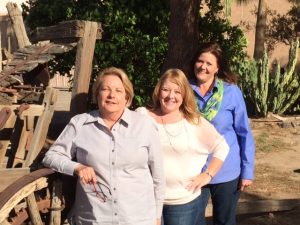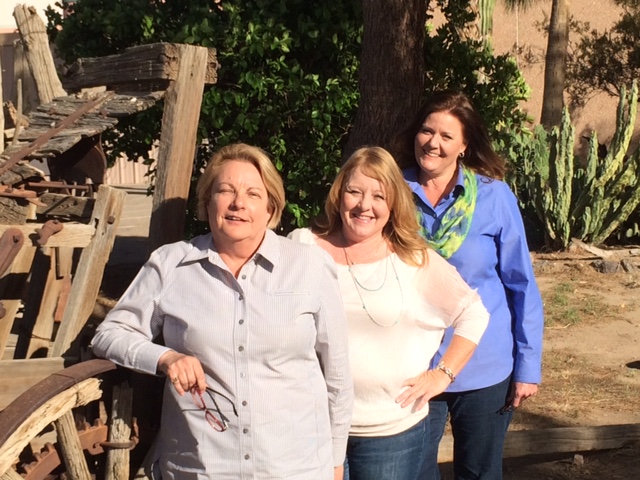
Pictured from left to right are Kay Day Pricola, executive director of the Imperial Valley Vegetable Growers Association, Linsey Dale, executive director of the Imperial County Farm Bureau, and Cherie Watte, executive director of Imperial Valley Water (IVH2O), photographed by a wagon used in the early days of farming.
Individually, the executive directors of the Imperial Valley’s three leading agricultural organizations advocate for the farmers they represent to ensure their interests are represented at all levels of government—local, state and federal.
Together, they represent a voice for the Valley’s agricultural industry—the industry upon which the Valley was founded, that to this day continues to drive the local economy as a billion dollar catalyst for growth, and that has faced an unprecedented period of change under the tenets of the nation’s largest agriculture-to-urban water transfer and the difficult realities of an ongoing drought.
The executive directors this article refers to are Linsey Dale of the Imperial County Farm Bureau, Kay Day Pricola of the Imperial Valley Vegetable Growers Association, and Cherie Watte of the newest organization, Imperial Valley Water or IVH2O.
“What you see here is the frontline,” said Watte, referring to the efforts she, Dale and Pricola undertake in advocating for Imperial Valley agriculture.
Added Pricola, “You have three women here not afraid to speak up.”
The three met recently at the Farm Bureau office in El Centro for this interview, a get together that came without some compromise of their time as all three keep incredibly busy schedules in representing their respective organizations. That’s not to say that it is rare to see the three together. Anyone who follows water issues in the Valley knows the three can frequently be seen together at Imperial Irrigation District meetings, county meetings and even during state and federal hearings to represent the importance of agriculture.
“When a farmer or a farm provider has an issue, they don’t have time to sit at an IID meeting for four hours, but we do,” Dale said. “We speak on their behalf when they cannot be there. We keep them in the know on issues.”
Pricola added, “We gather information, provide it to our boards, seek their input and represent them at functions like IID and the county.”
Though their roles may be similar in representing the interests of Valley agriculture, their journeys to their respective offices have been quite different. Each had already paved their own unique accomplishments on their paths to their current duties.
Dale, an Imperial Valley native, was the only one of the three who did not come from an agricultural background within her family. However, she would grow up to work for a farmer, and then the county’s Agricultural Commissioner’s Office before she left to focus on her degree in public administration from San Diego State University.
She eventually went to work for the Imperial County Farm Bureau as natural resources director, leading the Total Maximum Daily Load (TMDL) program, which at its core is meant to monitor and reduce silt in water channels as a way of improving water quality and safety.
Dale worked in that position for three years until she was named the executive director of the Farm Bureau, a position she has held for seven years.
One critical part of her job—explaining to legislators the importance of the Valley’s agriculture industry and how the actions they take—the legislation they sponsor—impact agriculture.
“I am a translator,” Dale said of the work to keep farmers up to date on critical issues affecting them and ensuring governing officials understand how their actions can either benefit or harm agriculture.
For Pricola, life began in a little agricultural community in Texas, but though her family farmed, she wanted no part of it.
“I couldn’t wait to escape a county of 110,000 and make my way to the city,” she said.
That’s exactly what she did. After earning a degree in education from Texas Tech University in Lubbock and going on to earn a master’s in finance from Southern Methodist University in Dallas, Pricola had a long career in marketing for American Airlines.
Life, more specifically marriage, would eventually bring her to the Imperial Valley in 2004. As she left behind one career, she found herself ready to start another, which first led her to Pioneers Memorial Hospital in Brawley where she worked as marketing director.
When the position opened up for the Imperial Valley Vegetable Growers Association, she sought it, in a sense returning to the field she fled so many years earlier. Not only was she hired for that position, she was also named executive director of the Coalition for Labor, Agriculture, and Business, another organization focused on advocacy. She has been in both jobs since 2013.
“Both positions are challenging and rewarding, and there are lots of areas of concerns to address in serving the needs of the membership,” Pricola said..
Whereas Dale’s Farm Bureau role has her overseeing issues pertaining to agriculture issues in general in the Valley, Pricola, as head of the Vegetable Growers, focuses on those issues specifically related to the Valley’s vegetable crop industry. It goes without saying that there is a great deal of crossover in what they do and those they represent.
Watte is the newest member of the three as her organization, IVH2O, was founded in 2015.
She, like Dale, is a native to the Imperial Valley. In fact, they both represent the fourth generations of their families in the Valley. Watte was born into a family that farmed and still does. While agriculture was in her blood, and she wanted it to be part of her future, she chose agricultural policy as her career path.
Watte pursued a degree in political science from University of California, Davis, which led her to a dream job—working on the House of Representatives Agriculture Committee—even before she finished her degree.
Watte eventually returned to school to finish her degree and from there went to work for the California Farm Bureau with a focus on food safety and international trade. Her next role was as director for international trade under Ann Veneman, then-Secretary for the California Department of Food and Agriculture
Then, Watte made a decision that allowed her to return to the Imperial Valley and start a family. She took a position as executive director of the California Asparagus Commission, a role that has enabled her to work from the Imperial Valley.
Her work with the Commission also gave her the freedom to join a new farming organization that had begun with a mission connected to the work the Farm Bureau and Vegetable Growers were already doing in the way of advocating for agriculture but with a slightly more centralized focus—water rights.
That new group, IVH2O, which has a membership that includes farmers from both the Farm Bureau and Vegetable Growers, among other members, has set itself to work advocating for the protection of the Valley’s water rights, in particular, as the ongoing drought has placed California agriculture on the frontline of water use challenges.
Dale said of Watte’s work. “She is key to holding the rights and provides support for both of us (Dale and Pricola) in advocating on so many fronts.”
Perhaps more so than any other issue, the protection of the Valley’s water rights has led the three farming groups to collaborate as a unified voice, including sharing a booth recently at the California Mid-Winter Fair & Fiesta where the three jointly shared the message of just how important local agriculture is to the Valley, the state and even the nation.
Dale, Pricola and Watte share the concern that as the drought lingers, there could be increased pressure to challenge the long-standing water rights that established nearly a hundred years ago under the compacts that govern the operation of the Colorado River, a resource shared by states up and down the Colorado River.
“We are at a crossroads,” Pricola said, adding the Valley needs to be prepared for the challenges that will come.
Watte explained that her organization is launching a new campaign titled, “Water for Life” as a way to reinforce why water rights matter to everyone in the Valley.
“It’s not just a farmer thing or a landowner thing,” she said. “It affects all of us.”
This month, IVH2O will host a water forum in which drought and the future of water rights will be discussed. The forum will be held April 6 at the Imperial Palms Resort in Holtville at 4 p.m. and will feature guest speaker Terry Fulp, deputy regional director for the U.S. Bureau of Reclamation Lower Colorado Region.
Beyond water rights, the three women also find themselves engaged in issues related to the Salton Sea, advocating for a restoration program that, first and foremost, protects the Imperial Valley’s air quality and health of the people who live in the Valley, but also protects the interests of the farmers, especially those who have land close to the Sea.
Education is key to what they do as well. In the past, they said, agriculture hasn’t done enough to ensure the public understands how the industry impacts everyone’s life. Too many, they point out, think the vegetables they eat or the milk they drink come from the grocery store. They lose sight of where food actually comes from. It starts with a lack of agricultural education in the schools.
“That’s why our three organizations are so important,” Dale said, adding they are working to build awareness, among their many duties.
In talking to the three, it is clear they believe in the work they do. That idea becomes even more clear when you consider the hours the three put in to their work. It is work that requires them to be responsive to their boards and the farmers they represent, to travel for the purpose of advocacy and to be outspoken at any given moment and at any meeting.
“I think all of us are passionate about it,” Pricola said. “My parents are rolling over in their grave and laughing that I care so much about an industry that was at my doorstep and walked away from.”
Watte said, “It’s a very personal matter, and it’s a real pleasure to do something that matters.”
Dale added, “It’s easy to be passionate about what you do when the farmers, the farm service providers and the people you come in contact with are so passionate and care so much about what they do.”
